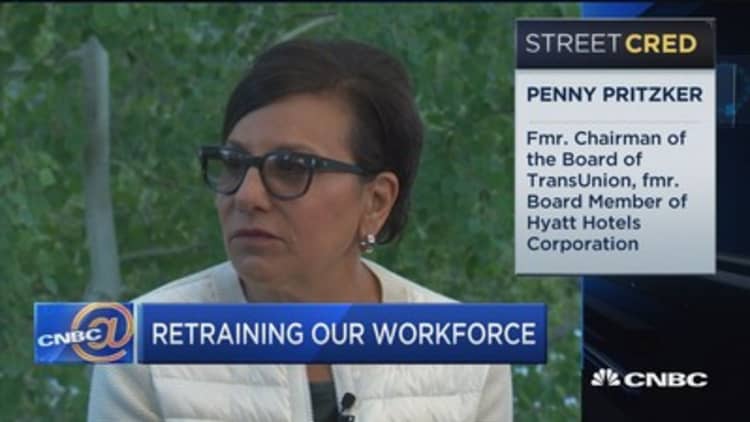According to the LinkedIn Workforce Report, January was the strongest month for hiring in the U.S. since May 2017. Across the country, hiring was 13 percent higher last month than it was the previous year.
These conditions make now a great time to be a worker in the job market, but one thing still makes it challenging for companies to quickly hire more employees: the skills gap.
The skills gap describes conditions in which the supply of workers with certain skills and abilities does not meet the demand from employers. Experts have been calling attention to the American skills gap for years.
"I think this is the defining issue of our time," says Penny Pritzker, founder of PSP Capital Partners and former secretary of Commerce. "Which is making sure not only that there are jobs and opportunity but also that the workforce is prepared for 21st-century jobs."

Some places have larger skill gaps than others. LinkedIn analyzed information from over 146 million profiles, over 20,000 companies and more than three million jobs in order to calculate which cities had the largest skills gaps.
After significant research, they found that these 10 cities had the largest skills gaps in the country:
10. Boston, MA
9. Raleigh-Durham, NC
8. Miami-Ft. Lauderdale, FL
7. Houston, TX
6. Seattle, WA
5. Los Angeles, CA
4. New York City, NY
3. Austin, TX
2. Washington, D.C.
1. San Francisco Bay Area, CA
The San Francisco Bay Area topped the list of the cities with the largest skills gap. LinkedIn found that the most abundant skills in the San Francisco Bay Area are tech-based including Python, C++ and Java. The skills that employers in the San Francisco area were most desperate for included healthcare management, sales and teaching.
Washington D.C. came in second behind San Francisco. The nation's capital had a surplus of people with skills such as politics, economics and security but is starved for people with health management, sales and manufacturing skills.
Pritzker tells CNBC that apprenticeship programs that focus on middle and high school aged students have helped several regions fill skills gaps such as these.
"The states that I think are most successful are making it much easier for while you're in grade school and high school to be able to get the kind of technical training that you need while its free in your public schools or going to the community colleges," she says. "These are the kinds of programs that we've seen in places like Delaware or Rhode Island or South Carolina or here in Colorado that could really pay off for our workforce."
One solution that LinkedIn suggests is simple — move.
"Skills gaps can be narrowed," states the report, "by people moving to cities where their skills are in demand."
Like this story? Like CNBC Make It on Facebook
Don't miss:




